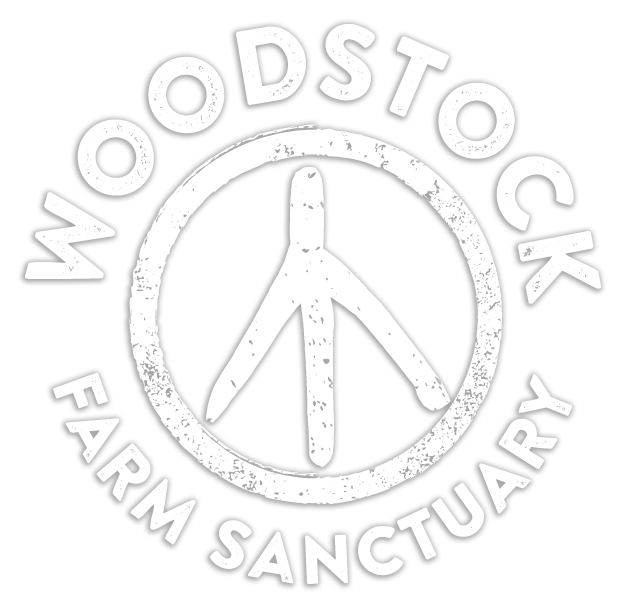Beyond the Baseline: Preserving Wildlife + Combatting the Climate Crisis
At Woodstock Farm Sanctuary, we work outside every day and can see the changing of the climate and the loss of biodiversity in real time. Early springs, light winters, torrential rain. We see larger mammal predators who are wary of people and would only come near if they are fleeing their homes because they were destroyed. We see invasive plants and bugs and see them take over ecological niches from native species. We know that climate change and the loss of wild spaces due to development and deforestation, as well as the use of pesticides and herbicides, is making populations of bugs, birds, and amphibians vanish. We can see it and observe it in front of us.
Our work centers on the harm caused to animals who are farmed, but the farming of them is also a huge environmental disaster – a leading cause of the climate emergency, the main reason for loss and transformation of wild spaces and river and ocean die offs, and thus the leading cause of the mass extinction event that we are experiencing collectively on planet Earth.
There’s a phenomenon called The Shifting Baseline where you assume what you are observing is what always has been. So you think there has always been this much air and car travel, this many high-speed roads, this few insects, or this immense land use for farmed animals. This causes you to not question what’s happening as you are comparing to yesterday instead of what was actually the norm for centuries and centuries.
That means if every year there are a few less bird songs around you, one day you will wake up with no bird songs and not realize what happened.
For Earth Day 2024, we wanted to share what we are trying to do in our small space and time to limit our personal harm and to do the right thing for the world around us. Sharing this will also hopefully help our supporters and friends observe this Shifting Baseline Syndrome themselves and fight for who is in front of us and around us.
Pia enjoying the long grass in her pasture.
OUR BIODIVERSITY PLEDGE
Woodstock Sanctuary recognizes that development and deforestation, largely due to farming, especially the farming of animals, has caused a huge loss of animals and plant life in the Hudson Valley where we live. The Sanctuary is located on 140 acres with a river and a large wild pond as well as meadow spaces and new growth forests that have sprung up after being cut down for farming cows over a hundred years ago. We are in a critical area for migration, homes for many species of animals, and protecting some keynote species that our ecosystem depends on. We are committed to the following:
Rewilding and restoring 60 acres of former farmland, a wild pond, and the Roundout Creek waterway that goes through the Sanctuary property
Limiting the mowing of our property and never removing leaves to help with soil health as well as provide protection and homes for key insects and amphibians
Planning and restoring meadows and expanding current pollinator gardens
Only planting native region-specific plants to help our native birds and bugs and not cause invasive species spread
Removing harmful invasive plant species
Never using any herbicides or pesticides in the environment
Using fences and buildings as protection against wild predators and never lethal methods
Never relocating wild animals of any type
Working with local licensed wildlife rehabbers and networks to help injured or diseased wild animals
Educate our team and volunteers on wildlife in our area and train on proper handling if necessary
Never build buildings or fence lines without an environmental analysis that includes waterways analysis
Research amphibian and reptile migratory patterns and create safe pathways through the Sanctuary to protect them and our residents
Build habitats for birds, key insects, and bats
Limit night light pollution which can disrupt bird migrations and cause harm to nighttime pollinators like moths and bats
Do volunteer days featuring our conservation work
Build our local community of environmental allies to work on local ordinances and legislation to protect wild spaces and wildlife
OUR CLIMATE PLEDGE
Woodstock Sanctuary recognizes the current global climate emergency and pledges to reduce its footprint as an organization and demonstrate responsible change by committing to the following:
Limiting organizational air travel
Advocating and educating about the immense harm to the climate and planet caused by farming animals
Trying to move to more sustainable energy systems at the Sanctuary such as solar and electric if we can find the funding
Cultivating and restoring meadows and forests on 60 acres of Sanctuary property that was formerly farmland to create carbon sink as well as habitat for wildlife
Composting food and earth-friendly waste from barns and on-site inn to turn into soil for the residents’ pastures and gardens
Gardening onsite to reduce shipping and packaging of produce items
Encouraging remote work, when possible, for our team to limit commuting emissions
Sponsoring, supporting, and amplifying like-minded organizations in the movement and environmental allies
Providing compost and recycling receptacles at all on-site events
Expand Public Education Tours and Advocacy to include more about the climate harm caused by animal farming
Using sustainable textile insulation in heated coops and barns to lower heat use
Do energy audit for all buildings and reduce use
Not distributing single-use bags or printed receipts at the Sanctuary Store
Moving from multi shipping providers to single
Limit plastic waste and stop selling single use plastic at our onsite store
Evergreen, continuous advocacy for climate action and environmental justice
NOTE: This is not an exhaustive list, and we aspire to continuously improve our efforts in lowering the organization’s environmental impact while knowing that caring for farmed animals is very resource and space intensive.


